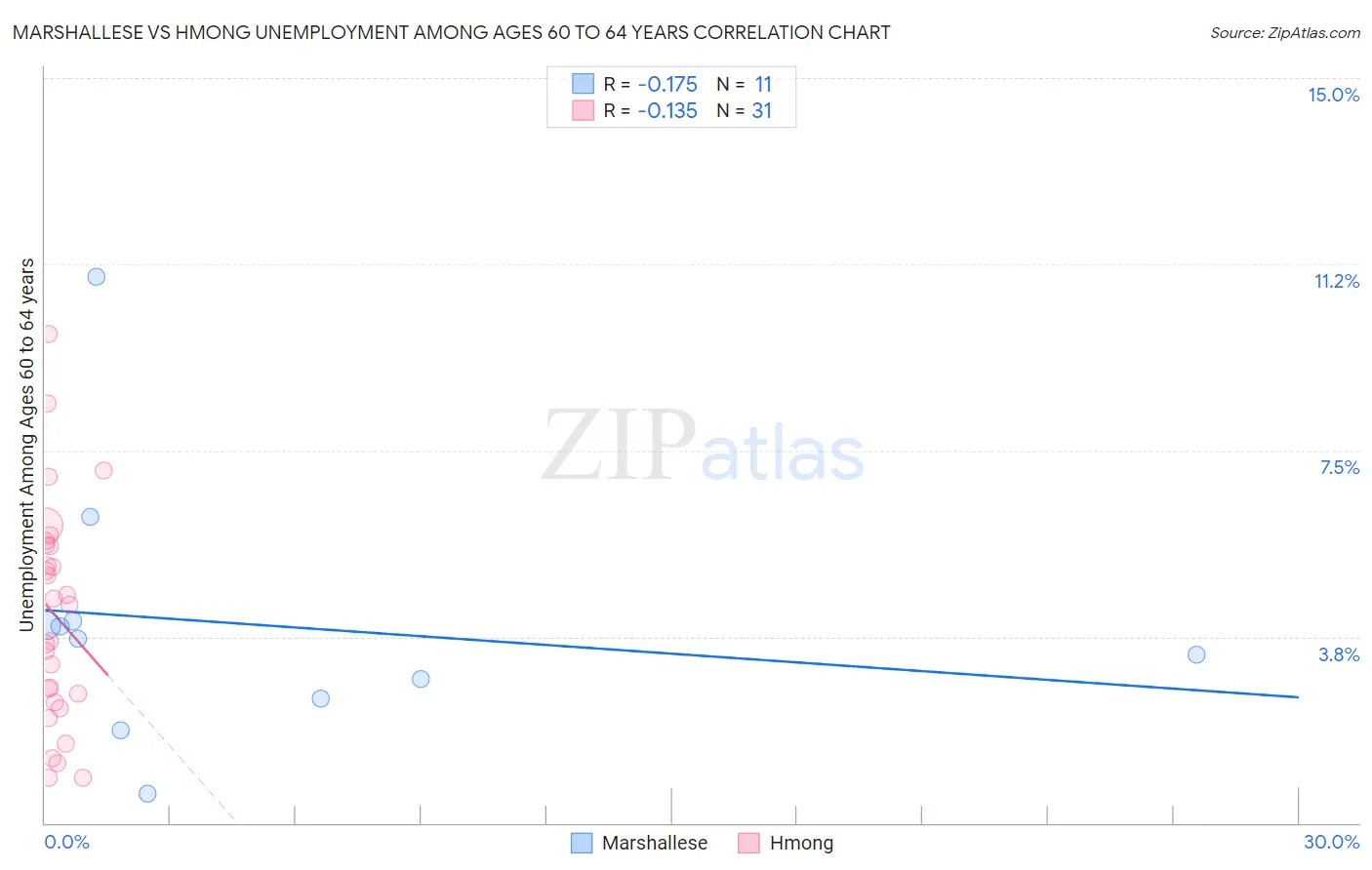Marshallese vs Hmong Unemployment Among Ages 60 to 64 years
COMPARE
Marshallese
Hmong
Unemployment Among Ages 60 to 64 years
Unemployment Among Ages 60 to 64 years Comparison
Marshallese
Hmong
3.7%
UNEMPLOYMENT AMONG AGES 60 TO 64 YEARS
100.0/ 100
METRIC RATING
1st/ 347
METRIC RANK
4.0%
UNEMPLOYMENT AMONG AGES 60 TO 64 YEARS
100.0/ 100
METRIC RATING
4th/ 347
METRIC RANK
Marshallese vs Hmong Unemployment Among Ages 60 to 64 years Correlation Chart
The statistical analysis conducted on geographies consisting of 14,034,493 people shows a poor negative correlation between the proportion of Marshallese and unemployment rate among population between the ages 60 and 64 in the United States with a correlation coefficient (R) of -0.175 and weighted average of 3.7%. Similarly, the statistical analysis conducted on geographies consisting of 24,490,081 people shows a poor negative correlation between the proportion of Hmong and unemployment rate among population between the ages 60 and 64 in the United States with a correlation coefficient (R) of -0.135 and weighted average of 4.0%, a difference of 7.2%.

Unemployment Among Ages 60 to 64 years Correlation Summary
| Measurement | Marshallese | Hmong |
| Minimum | 0.60% | 0.90% |
| Maximum | 11.0% | 9.8% |
| Range | 10.4% | 8.9% |
| Mean | 4.0% | 4.2% |
| Median | 3.7% | 4.4% |
| Interquartile 25% (IQ1) | 2.5% | 2.4% |
| Interquartile 75% (IQ3) | 4.1% | 5.6% |
| Interquartile Range (IQR) | 1.6% | 3.2% |
| Standard Deviation (Sample) | 2.7% | 2.2% |
| Standard Deviation (Population) | 2.6% | 2.2% |
Demographics Similar to Marshallese and Hmong by Unemployment Among Ages 60 to 64 years
In terms of unemployment among ages 60 to 64 years, the demographic groups most similar to Marshallese are Fijian (3.9%, a difference of 3.7%), Chinese (4.0%, a difference of 6.7%), Immigrants from the Azores (4.0%, a difference of 7.2%), Immigrants from Congo (4.1%, a difference of 10.1%), and Lumbee (4.2%, a difference of 11.1%). Similarly, the demographic groups most similar to Hmong are Immigrants from the Azores (4.0%, a difference of 0.010%), Chinese (4.0%, a difference of 0.42%), Immigrants from Congo (4.1%, a difference of 2.7%), Fijian (3.9%, a difference of 3.3%), and Lumbee (4.2%, a difference of 3.7%).
| Demographics | Rating | Rank | Unemployment Among Ages 60 to 64 years |
| Marshallese | 100.0 /100 | #1 | Exceptional 3.7% |
| Fijians | 100.0 /100 | #2 | Exceptional 3.9% |
| Chinese | 100.0 /100 | #3 | Exceptional 4.0% |
| Hmong | 100.0 /100 | #4 | Exceptional 4.0% |
| Immigrants | Azores | 100.0 /100 | #5 | Exceptional 4.0% |
| Immigrants | Congo | 100.0 /100 | #6 | Exceptional 4.1% |
| Lumbee | 100.0 /100 | #7 | Exceptional 4.2% |
| Immigrants | Micronesia | 100.0 /100 | #8 | Exceptional 4.2% |
| Indonesians | 100.0 /100 | #9 | Exceptional 4.2% |
| Immigrants | Bosnia and Herzegovina | 100.0 /100 | #10 | Exceptional 4.2% |
| Luxembourgers | 100.0 /100 | #11 | Exceptional 4.3% |
| Immigrants | Cuba | 100.0 /100 | #12 | Exceptional 4.3% |
| Chickasaw | 100.0 /100 | #13 | Exceptional 4.3% |
| Norwegians | 100.0 /100 | #14 | Exceptional 4.3% |
| Sudanese | 100.0 /100 | #15 | Exceptional 4.3% |
| Danes | 100.0 /100 | #16 | Exceptional 4.4% |
| Immigrants | Afghanistan | 100.0 /100 | #17 | Exceptional 4.4% |
| Slovenes | 100.0 /100 | #18 | Exceptional 4.4% |
| Tsimshian | 100.0 /100 | #19 | Exceptional 4.4% |
| Afghans | 100.0 /100 | #20 | Exceptional 4.4% |